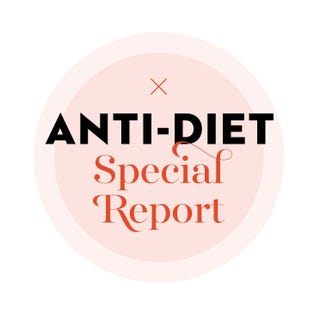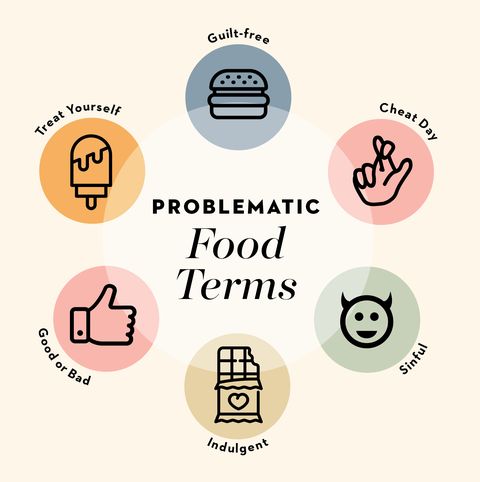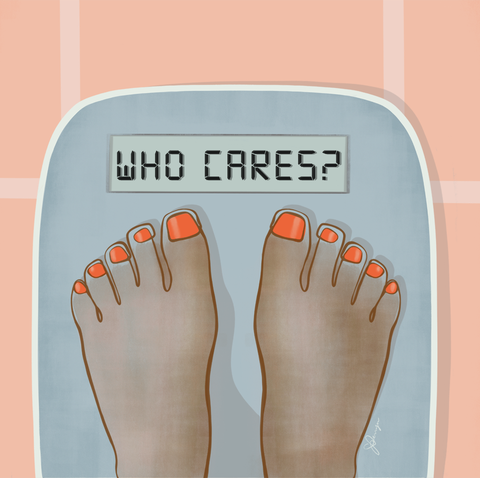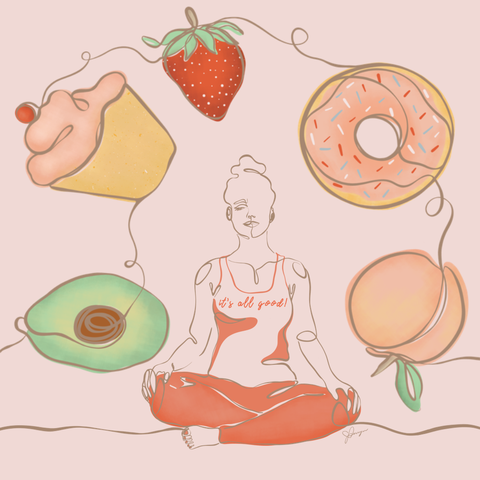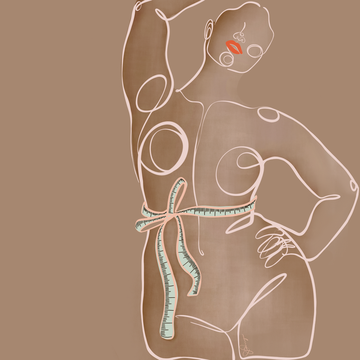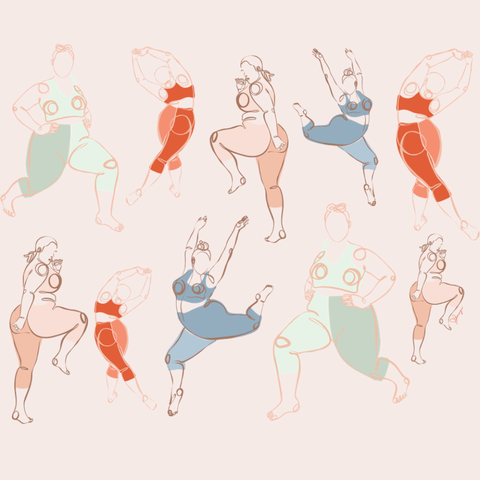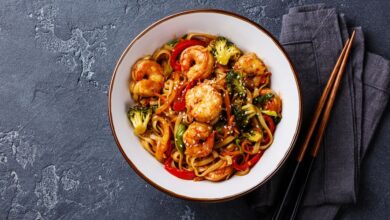Exploring the Toxic Language of Diet Culture

[ad_1]
Throughout 2021, Good Housekeeping will be exploring how we think about weight, the way we eat, and how we try to control or change our bodies in our quest to be happier and healthier. While GH also publishes weight loss content and endeavors to do so in a responsible, science-backed way, we think it’s important to present a broad perspective that allows for a fuller understanding of the complex thinking about health and body weight. Our goal here is not to tell you how to think, eat, or live — nor is to to pass judgment on how you choose to nourish your body — but rather to start a conversation about diet culture, its impact, and how we might challenge the messages we are given about what makes us attractive, successful and healthy.
Growing up Catholic and female, guilt was my secondary religion. As early as kindergarten, I learned to idolize the saints who starved themselves to get closer to God, their bodily emptiness leaving more room for the spirit to enter. My religion taught me that indulgence was sinful, and the magazines I read, commercials I saw on TV and the “diet foods” my mom bought once in a while all reinforced the same message, so it’s no wonder my teenage brain twisted denying myself food into something akin to a spiritual practice.
It took years (and a lot of therapy) for me to realize a higher power that wants me to deny the body it made is hardly worthy of my devotion, and that eating a salad instead of spaghetti is not a moral imperative. That instead, nourishing myself is an act of radical self love.
But society hasn’t quite gotten the message. Walk into any grocery store and many restaurants, and moralizing language barrages us from all sides. “Guilt-free,” screams a box of frozen yogurt bars. “Cheat day tips,” leers the magazine rack. “Treat yourself,” whispers the snack food aisle. Language like this isn’t just false advertising: I’d argue it’s triggering and damaging.
Why do we talk about food in moral terms?
Hunger pangs come from our brains, wired to crave nourishment so our bodies don’t starve to death. But diet culture, which places thinness at the pinnacle of achievement, health, morality and more, takes this biological imperative and twists it backwards. Because our society tells us our bodies have to look a certain way to be worthy of love, many of us have developed guilt and anxiety around obeying the very signals that keep us alive.
It’s not revolutionary to acknowledge that food and our feelings are connected. “Our bodies release the pleasure chemical dopamine when we eat because it fuels life. Guilt, anxiety and fear, on the other hand, are primal emotions that evolved millions of years ago to adapt to situations that threaten our survival,” explains food expert and anti-diet culture activist Christine Delozier. “Situations like dinner don’t call for emotions like these, which are relics of our past living conditions,” when food may have been scarce, or the timing of the next meal uncertain.
Words that place a moral value on certain foods also give us direction on what to eat that doesn’t require looking inward to consider what we may want to eat or, for that matter, educating ourselves on what nutrients our bodies actually need. “They really encourage behaviors or thought processes that make people distrust their own body’s response to food, and offer them alternatives to ignore hunger cues,” explains National Eating Disorder Association (NEDA) director of programs Lauren Smolar.
We’ve all had lunch with a friend who says she’s going to “be bad” and order dessert, or attended a holiday gathering where someone proclaims they haven’t eaten all day so they can really dig in at the buffet. “Those things perpetuate the whole idea that you only deserve nourishment if you’ve earned it by not eating or by restricting in some way,” says mental health advocate Achea Redd, author of Be Free, Be You.
And the more we buy into the idea that certain foods are “good,” the more we literally put our money where our mouths are. “Marketers capitalize on our feelings of inadequacy by labeling foods ‘guilt-free,’ reinforcing the notion that we should feel like we did something wrong when we eat,” Delozier notes. “And if you don’t look like the person on the [TV] screen, there’s something wrong with you.”
And it’s not just food packaging that’s the problem. With summer approaching and COVID-19 restrictions easing, many of us are emerging, blinking into the sunlight for what feels like the first time. With it, comes messaging around “summer bodies,” “pandemic weight,” and associated anxiety that has nothing to do with the virus.
Experts reinforce that these attitudes can trigger those with eating disorders, or those with disordered eating who may not even realize their relationship to food might be harming them. “This language supposes that you should always be conscious of eating in a restrictive way, and feel guilty if you eat in a way that brings you enjoyment,” explains Maria Rago, Ph.D. president of the National Association of Anorexia Nervosa and Associated Disorders (ANAD). “Messages that assume that you should ‘watch what you eat’ can cause anxiety and doubt for people who are trying to let go of over-control over their food choices,” says Rago, as evidenced by Demi Lovato’s recent feud with a fro-yo shop after she claimed that the store was front-loaded with “sugar-free cookies/other diet foods.” That’s why, Rago continues, “it’s important not to reinforce obsessive and compulsive ways of eating.”
There’s no such thing as “good” or “bad” food
Recognizing my own triggers was a crucial step toward repairing my relationship with food. Before my eating disorder, I had certain “fear foods” that I wouldn’t touch. At my worst, I gagged at the very idea of mayonnaise. Its texture reminded me of the fat cells we’d seen in high school biology and I could just see that quivering excess attaching itself to my own body, an idea I’m sure I picked up from that oft-repeated and equally problematic adage, “A moment on the lips, forever on the hips.”
But learning how to cook and understanding how ingredients work together to create the complex dishes with flavors I love defanged previously “scary” foods. I learned about the magic of emulsification, the process of assertively whisking together egg yolks, vinegar, mustard and salt and then slowly, almost meditatively, streaming in oil until it thickens into something new entirely: mayonnaise. Imagine my delight when I found it’s actually delicious smeared on a burger or as an accompaniment to fries. Once I broke food down into its component parts and understood how to put them back together again, even my most feared food looked like a kind of alchemy. Like Dorothy and her wizard, the enemy held no power over me once I pulled back the curtain.
“Education about food is still on the table, but assigning feelings of guilt, anxiety and shame, are not,” says Delozier, and for Redd too, education has been key. “We live in a world, and we can’t always change that world, but we can change how we live in it,” she says. “The way that we’ve started to lean into social inequality, education and even social-emotional education, I think we need to lean into anti-diet culture education. Knowledge is very powerful, and it will give you new language for things.” When she encounters previously triggering language around diet foods, she likes to think she has secret knowledge that empowers her to make her own choices. “When I see those words like ‘guilt free’ I’m like, ‘Gosh, I wish they had the education that I do.’
It’s time to learn a new language
The first step is recognizing the moralizing food language that is problematic in the first place. And that can be hard because it’s so pervasive. “Dieting is firmly rooted in American culture, and so is the judgmental attitude toward the self and others that accompanies it,” Rago explains. Words like “cheat day” and “guilt-free” imply that eating what your body wants, when it wants it, is something we should feel bad about.
Instead, Rago advises approaching the act of feeding your body with kindness and flexibility. Sometimes your body wants a potato; other times, a salad hits the spot. There’s nothing wrong with either choice. Helping each other notice when we’re falling into moralizing speech can empower us all to reframe the conversation, too. When Redd’s friends or family say they’re going to “be good” by not ordering dessert, she’ll gently respond, “you are good, either way.”
Rago also suggests keeping an eye out for situations or wording that may be triggering for you personally and writing them down for yourself. “Then you can write out the alternative ways you can look at this, the superiority or judgmental messages within, and make a decision not to buy into it.” She suggests replacing phrases like “I was so bad today!” with “everything in moderation,” or “eat to enjoy life.” Remembering to frame food as nourishment and energy to do the things you want to do can help, too.
Some people may not be at a mental place where they can talk back to diet culture just yet, Smolar adds. They may need to avoid places with harmful language until they’re further along in their journey away from the damaging messages from diet culture. And that’s a valid place to be, too.
If your thoughts around food are interfering with your life, you may benefit from talking it out with a professional. NEDA’s screening tool can help you figure out if your relationship to food has crossed over into worrisome territory. We all deserve health, happiness, and fullness, regardless of what our bodies look like. And we deserve to treat both them and the foods we nourish ourselves with in a neutral, nonjudgmental way. It’s a cookie, not a hand grenade.
Anyone feeling like they are suffering from disordered eating or an eating disorder can and should reach out for help immediately. The NEDA helpline at (800) 931-2237 is available daily via call or text, and officials also are on standby in digital chats, ready to help you find resources in your area. If you are concerned about a loved one, learn more about how you can help.
This content is created and maintained by a third party, and imported onto this page to help users provide their email addresses. You may be able to find more information about this and similar content at piano.io
[ad_2]
Source link


